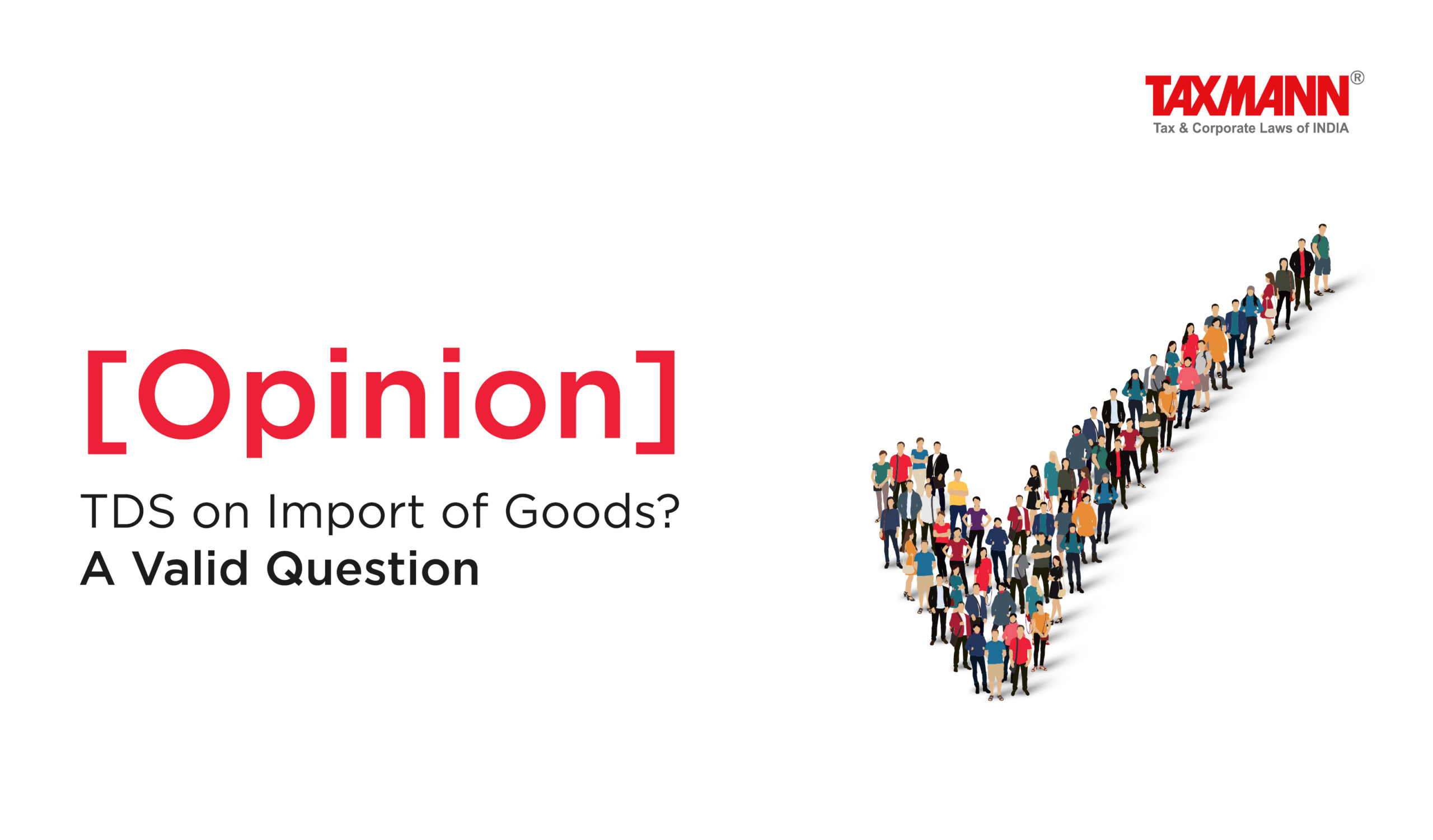[Opinion] TDS on Import of Goods? A Valid Question
- Blog|News|Income Tax|
- 2 Min Read
- By Taxmann
- |
- Last Updated on 16 August, 2023

Does A Ltd, an Indian company, need to deduct TDS (Tax Deducted at Source) when making a payment of INR 5 crores for the imported goods to India from S Ltd, a Singaporean company, in August 2023? It is important to note that S Ltd is a tax resident of Singapore and does not have a Permanent Establishment (PE) in India.
The immediate response that pops up to the above question is “No” since the non-resident seller, S Ltd, is a tax resident of Singapore and does not have a Permanent Establishment (PE) in India. However, it’s worth noting that there is a valid uncertainty regarding TDS on the import of goods, even when the non-resident seller has no PE in India. This uncertainty arises due to the introduction of the concept of Significant Economic Presence (SEP), which may impact the tax implications on such transactions.
The Concept of SEP
The concept of SEP was initially introduced as Explanation 2A to Section 9(1) of the Income Tax Act, 1961 (referred to as “the Act”) through the Finance Act of 2018. It was designed to broaden the scope of the business connection for tax purposes. Initially, the implementation of SEP provisions was intended for the Financial Year (FY) 2018-19, but it was postponed due to ongoing international discussions related to the taxation of the digital economy. As a result of these discussions, the SEP provisions were eventually implemented and enforced, starting from the FY 2021-22 as below:
“Explanation 2A.—For the removal of doubts, it is hereby declared that the significant economic presence of a non-resident in India shall constitute “business connection” in India and “significant economic presence” for this purpose, shall mean—
(a) transaction in respect of any goods, services or property carried out by a non-resident with any person in India including provision of download of data or software in India, if the aggregate of payments arising from such transaction or transactions during the previous year exceeds INR 2 crores; or
(b) systematic and continuous soliciting of business activities or engaging in interaction with 3 lakh number of users in India:
Provided that the transactions or activities shall constitute significant economic presence in India, whether or not—
(i) the agreement for such transactions or activities is entered in India; or
(ii) the non-resident has a residence or place of business in India; or
(iii) the non-resident renders services in India:
Provided further that only so much of income as is attributable to the transactions or activities referred to in clause (a) or clause (b) shall be deemed to accrue or arise in India.”
The above expanded scope of “business connection” is only brought under the Act and does not override a Double Taxation Avoidance Agreement (DTAA), which follows the traditional permanent establishment definition.
Therefore, any non-resident having transaction of sale of goods to any person/persons in India for a value of more than INR 2 crores in a FY shall constitute business connection in India as per the Act for that FY through the newly established SEP concept.
Click Here To Read The Full Article
Disclaimer: The content/information published on the website is only for general information of the user and shall not be construed as legal advice. While the Taxmann has exercised reasonable efforts to ensure the veracity of information/content published, Taxmann shall be under no liability in any manner whatsoever for incorrect information, if any.

Taxmann Publications has a dedicated in-house Research & Editorial Team. This team consists of a team of Chartered Accountants, Company Secretaries, and Lawyers. This team works under the guidance and supervision of editor-in-chief Mr Rakesh Bhargava.
The Research and Editorial Team is responsible for developing reliable and accurate content for the readers. The team follows the six-sigma approach to achieve the benchmark of zero error in its publications and research platforms. The team ensures that the following publication guidelines are thoroughly followed while developing the content:
- The statutory material is obtained only from the authorized and reliable sources
- All the latest developments in the judicial and legislative fields are covered
- Prepare the analytical write-ups on current, controversial, and important issues to help the readers to understand the concept and its implications
- Every content published by Taxmann is complete, accurate and lucid
- All evidence-based statements are supported with proper reference to Section, Circular No., Notification No. or citations
- The golden rules of grammar, style and consistency are thoroughly followed
- Font and size that’s easy to read and remain consistent across all imprint and digital publications are applied



 CA | CS | CMA
CA | CS | CMA
